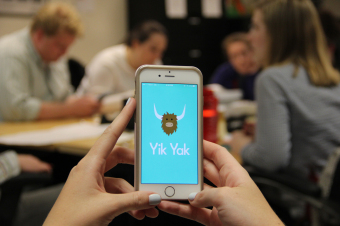School officials across the country have become concerned with the popular mobile app, Yik Yak. The app is a forum where users can post anonymous short messages. Yik Yak users can look through other messages posted by people within a 1.5 mile radius of them and can post short responses to posts.
If you have ever scrolled down to the comments of a YouTube video, you know that Internet arguments can become heated. Like most online forums, though, YouTube requires users to create an account before they can begin trolling other videos.
Yik Yak, on the other hand, is completely anonymous. The lack of responsibility for a comment made on Yik Yak has caused some school officials around the country to worry that the app will become a hub for cyberbullying.
While Yik Yak seems to be innocuous the majority of the time, the New York Times reported that some professors and students found not-so-innocent posts on Yik Yak, as well as threats. Some were personal and directed at a particular person, while others have targeted larger groups. For example, a professor at Eastern Michigan University felt victimized by students who used Yik Yak to write demeaning and sexually explicit messages about her. Meanwhile, a student at Kenyon College utilized Yik Yak to suggest a gang rape in the women’s center.
Yik Yak might harbor some unsavory comments at universities across the country, but here at Fordham it seems to be used for relatively harmless purposes.
“I don’t really think that Yik Yak is harmful to anyone. Most of the posts on there aren’t targeted at anyone. Usually they’re just jokes that everyone can enjoy. It’s amusing,” says Helen Keating, GSB ’18.
Some schools disagree. The New York Times reported that a handful of universities have already banned the app from their servers, while others are in the process of considering removing the app from their Wifi networks.
Colleges should abandon efforts at trying to limit their students’ Yik Yak use.
Since Yik Yak is a mobile app, students can just use their cellular service to access the app, so banning the app on the Wifi network would raise more problems than fix any that may or may not exist. Limiting access to a social app that many students enjoy using would be viewed as an infringement of free student speech. Many universities, including Fordham, are already under scrutiny for a perceived lack of free speech. A ban on Yik Yak would only cause further outrage from the student body.
While colleges should stop trying to control Yik Yak’s increased campus presence, users of the app should also make an effort to be more civil on the anonymous app. After all, Yik Yak’s creators, Tyler Droll and Brooks Buffington, aimed the app at college students with the belief that people in that age range were mature enough to handle the anonymous aspect of the app. Droll and Buffington even disabled the app at many high schools in order to prevent cyberbullying, without realizing that it had become a problem on the very college campuses for which they had designed Yik Yak.
It would be foolish to expect every single post on Yik Yak to contain a positive message.
After all, the app is a great place to complain about the school, classes or student life, because the chances are high that other users will agree. But it is also not too much of a burden to expect users to refrain from posting threats or insults directed at a specific person.
Indeed, Yik Yak’s staff has already put some precautions in place. Certain keywords, such as the word “bomb,” will stimulate a pop-up that asks whether the post might be offensive and warns the user that law enforcement takes threats seriously. In the past, Yik Yak has cooperated with police to track a message that implied a gun threat. The app is definitely committed to creating a more positive user experience. It is the users’ turn to make an effort to be more respectful on the app.
Although there may be particular instances in which Yik Yak could facilitate the spread of harmful messages, like Kenyon’s rape threats, Yik Yak is ultimately just a simple way to pass time by sharing jokes with everyone else who uses the app on campus. As long as no serious problems arise from the app’s anonymous messages, colleges should allow students to use Yik Yak.
Margarita Artoglou, FCRH ’18, is a communication and media studies major from Queens.





